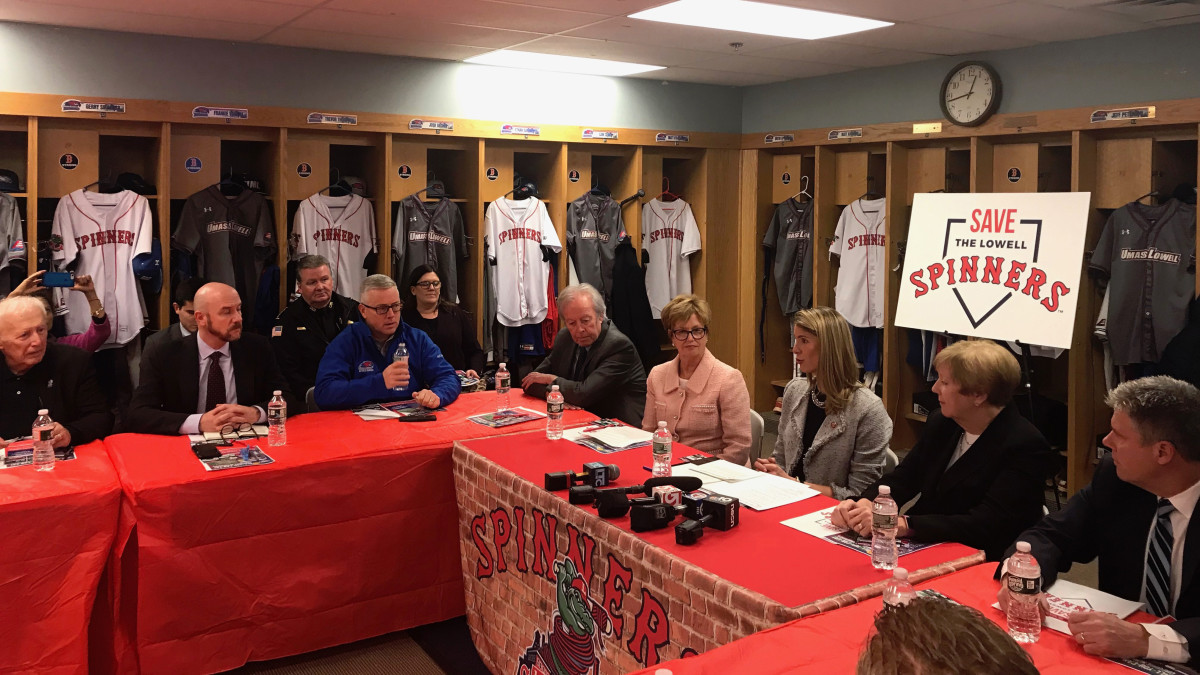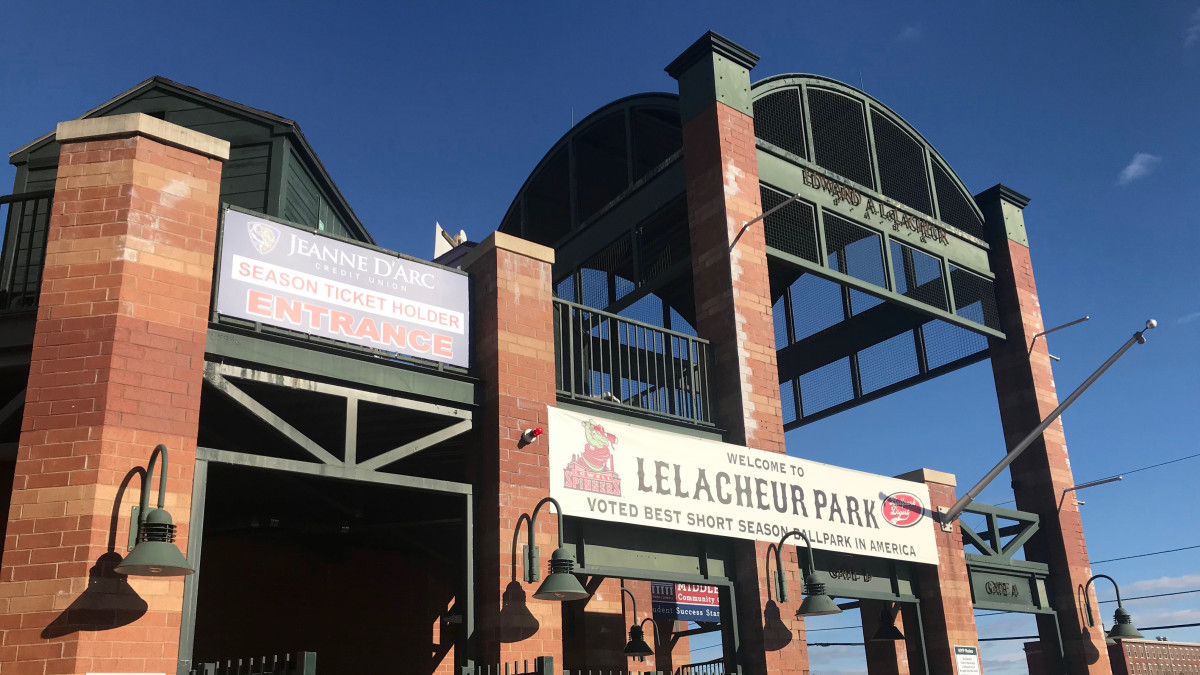Save the Spinners: How One Town Attempts to Stave Off MLB's Contractual Plan for the Minors


LOWELL, Mass. — Major League Baseball’s controversial plan to reorganize Minor League Baseball faces headwinds as local communities who stand to lose their teams—and accompanying jobs, business and investment—unify efforts to persuade or, if necessary, try to stop MLB.
One such community is Lowell, Massachusetts, a city of about 112,000 people and home of the Lowell Spinners. The Spinners are the Class A Short Season affiliate of the Boston Red Sox. They are one of 42 teams rumored to face losing a major league affiliation as part of a tentative MLB initiative to contract the minor leagues.
On Tuesday, U.S. Congresswoman Lori Trahan (D-Massachusetts and Lowell native) chaired a community meeting at the Spinners’ LeLacheur Park. Trahan, along with U.S. Congressman David McKinley (R-West Virginia), is leading a bipartisan effort in Congress to ensure that MLB appreciates the gravity of legal risks and political fallout it could face.
“Major League Baseball,” Trahan stressed to a packed clubhouse room of community and business leaders, “received a sweetheart deal in 2018 by getting an exemption from the Fair Labor Standards Act.” Trahan’s remark about the FLSA exemption is sure to attract notice in the office of MLB commissioner Rob Manfred and in offices of attorneys who are representing minor league players.
This FLSA exemption was contained in the Save America’s Pastime Act of 2018, a law that denies minor league ballplayers possible guarantees to minimum wage and overtime pay. The Act is a core component of the unusual economics of minor league baseball. Through affiliation contracts, MLB teams pay minor league ballplayers’ salaries and subsidize other employment benefits. Meanwhile, owners of minor league teams pay for field, equipment, uniforms and other expenses related to non-personnel operations.
This bifurcated arrangement has led to many minor league players earning under the federal poverty level, which is $12,490 for a single person and $25,750 for a family of four. It has also sparked MLB and MiLB to point fingers at each other for creating what is generally viewed as an unprofitable enterprise. MLB complains that it spends hundreds of millions of dollars a year on expenses that mainly benefit minor league teams. MiLB, for its part, grumbles that it incurs tens of millions of dollars a year in expenses related to the development of players for the big leagues.
The Save America’s Pastime Act is problematic for a group of more than 40 minor league players who are currently suing baseball in federal court. In Senne v. Kansas City Royals, the players, who emphasize that they work between 60 and 70 hours per week, insist that they have been unlawfully denied both minimum wage and overtime pay. The players’ lead attorney is former minor league pitcher Garrett Broshuis, who went to law school after pitching for the San Francisco Giants' organization during the 2000s. The players’ litigation would be enhanced if the Save America’s Pastime Act is repealed or modified—a possibility captured in Trahan’s warning shot.
Trahan and like-minded members of Congress could deploy other tools to disrupt MLB’s business. The most notable among them is the possibility of rescinding or constraining MLB’s antitrust exemption. The exemption, created by the U.S. Supreme Court in 1922 and narrowed by the Curt Flood Act of 1998, continues to shield MLB from potential antitrust litigation brought by minor league players. A bipartisan act of Congress and a signature of President Donald Trump could further tighten and confine the exemption. Even if no such legislation is passed, Trahan could hold Congressional hearings that require MLB officials to testify and share information.
On Tuesday, however, the focus of the “Save the Spinners” community meeting was on how the potential loss of the Spinners would hurt the City of Lowell and the surrounding community. Community members also discussed what steps they could take to avert this unwanted possibility.
Lowell City Manager Eileen Donoghue, who helped her city land the Spinners in 1996, opined that “the suggestion that it will all come to an end [for the Spinners] is truly heartbreaking.” Donoghue reminded audience members that her city has made more than $1 million in improvements in and around LeLacheur Park and has done so “without condition.” Lowell, Donoghue maintained, “has demonstrated to Major League Baseball that it is a partner.”

Donoghue’s reference to ballpark improvements is important since MLB’s contraction plan is in part driven by the fact that some minor league ballparks are outdated and deficient. Trahan seized on that point to emphasize that to whatever extent inadequate ballparks are a viable justification for MiLB contraction, such a justification doesn’t apply to LeLacheur Park.
“Our stadium is not in disrepair.” Trahan underscored. “Let the conversation be about stadium quality—a targeted conversation—rather than an across the board cut with undeserving casualties.”
Trahan, a former Division I volleyball player at Georgetown University, also objected to MLB’s plan on account that it would betray important and historical connections between the sport of baseball and our country. “This proposal,” Trahan warned, “would essentially forfeit [baseball’s] connection with the communities that have nurtured and developed the talent we see in big leagues.” She added that efforts to reform minor league baseball should be “about keeping America’s national pastime national” and stressed that “baseball will evaporate from communities” where there are no major league or minor league teams.
The meeting also highlighted the perception of MLB and its billionaire owners as acting without transparency. Spinners general manager Shawn Smith, a longtime baseball executive and a former G League (then called the NBA Development League) vice president, bluntly asked, “What is their issue with us?”
Smith’s use of “their” was a reference to ownership groups of the 30 MLB franchises. Those owners reportedly support minor league contraction. As mentioned by several people in the meeting, none of those owners have openly discussed their position with impacted minor league teams.
Smith also emphasized that uncertainty over the Spinners’ future has been disruptive to the team’s commercial operations. “Our business partners and season ticket holders have been asking” Smith about the team’s future. He also noted that the City of Lowell will lose outside investment if the Spinners fold. “The vast majority of our fans come from outside of Lowell . . . our job to let them see the great safe community we have.”
As detailed in a Sports Illustrated legal story, minor league teams could potentially sue MLB and MLB clubs on a variety of grounds, including breach, unfair and deceptive trade practices, tortious interference, constructive fraud and state antitrust violations. Although Smith in no way implied a potential legal fallout for the Spinners, his factual narrative of the situation highlights possible grounds for legal action.
The meeting also delved into strategies for rallying opposition. To that end, Lowell businessperson Jim Campanini, a trustee of Middlesex Community College and a former editor-in-chief of The Lowell Sun, suggested the creation of a national “save the minor leagues” website. He further stressed the value of a “grassroots” campaign that would recruit former minor league players—“not necessarily the players who later became big-league stars,” Campanini noted, “but the ones who were genuinely enriched by coming to Lowell” and who became part of this north of Boston community near the New Hampshire border.
The time to act is soon. As Trahan stressed, if MLB’s plan is approved, it “would take effect next year—this is not far away.” Indeed, the current agreement between MLB and MiLB is set to expire this September. The two sides continue to negotiate.
MLB, for its part, stresses that no plan has been finalized and that rumors of specific minor league teams losing their affiliation are inaccurate and premature. Still, for Lowell and other communities across the country, it’s clear that MLB intends to restructure the minors in a way that will probably lead to fewer minor league teams with MLB affiliations. Those communities are also aware that MLB is hardly suffering financially. A couple of weeks ago, it was reported that MLB generated $10.7 billion in revenue during the 2019 season—an all-time high for baseball. It remains to be seen whether those riches will be shared with communities like Lowell.
Michael McCann is SI’s Legal Analyst. He is also an attorney and the Director of the Sports and Entertainment Law Institute at the University of New Hampshire Franklin Pierce School of Law.
